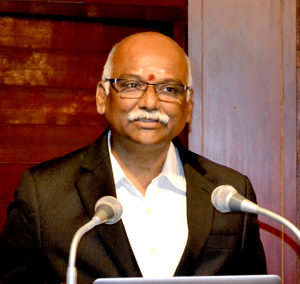 Cyber threats have increased during the lockdown that was imposed in the wake of the covid pandemic and technology systems were put to test at unprecedented levels, said R. Gandhi, former deputy governor of the Reserve Bank of India and emphasized that as we move towards resuming normal socio, economic and other activities, organizations, including banks and financial institutions will have to make major changes to their structure, operations and approach.
Cyber threats have increased during the lockdown that was imposed in the wake of the covid pandemic and technology systems were put to test at unprecedented levels, said R. Gandhi, former deputy governor of the Reserve Bank of India and emphasized that as we move towards resuming normal socio, economic and other activities, organizations, including banks and financial institutions will have to make major changes to their structure, operations and approach.
Addressing board members of various banks on the topic ‘Cyber Security during Pandemic and Beyond’ at a webinar which was part of an initiative by the Institute for Development and Research in Banking Technology (IDRBT) as part of its eLearning program, Gandhi said first of all banks have to pay greater attention to crisis preparedness, systems resilience and access to healthcare and subsequently they have to make structural changes in terms being flexible and rules, procedures, infrastructure, compensation, etc., will need review and reassessment. They also have to redesign office layouts to take care of social distancing develop a commitment to hygiene, cleanliness and safety and finally be ready to help staff redesign their homes and make them ‘Work Ready’ to facilitate work from home.
Also, he said, banks will have to pay special attention to cyber security while enabling their staff to work remotely from home or on mobile spots while revisiting their BCP as in pandemic conditions banks will not be able to reach their staff to the data centres. Hence, WFH will be an integral part of BCP., he said, adding banks will have to quickly reorganise their data centres from “Active-Passive” centres to “Active-Active” centres.
Gandhi pointed out that with increasing reliance on digitization, banking has already been a fertile ground for hackers and cyber fraudsters and with the virtual certainty of remote working and WFH being the new normal, the relevance and continued vigil on cyber security cannot be overemphasised, he said, adding: “A strong element of cyber security will be to imbibe the security culture and security by design in the minds of every staff member.
Given the current constraints and the continuing need to prepare the bankers for the evolving situation and ensure uninterrupted banking services, the Institute recently introduced an e-Learning Channel for its training programmes.
The IDRBT initiative is focused on board members of banks, especially since the covid crisis calls for close monitoring and interventions by the board.
Earlier, initiating the proceedings, Dr A. S. Ramasastri, director, IDRBT, made a strong pitch for Zero Trust Architectures to continuously validate customers’ identity as well as employees’ identity in the context of Work From Home. He also said humans are the weakest link in the security, and in the present scenario they are vulnerable (psychologically) than ever before to social engineering attacks, particularly emanating in the form of covid-related malware. Ramasastri also said in order to manage business continuity with only limited staff availability, employees need to be re-skilled to multi-task, when necessary.







